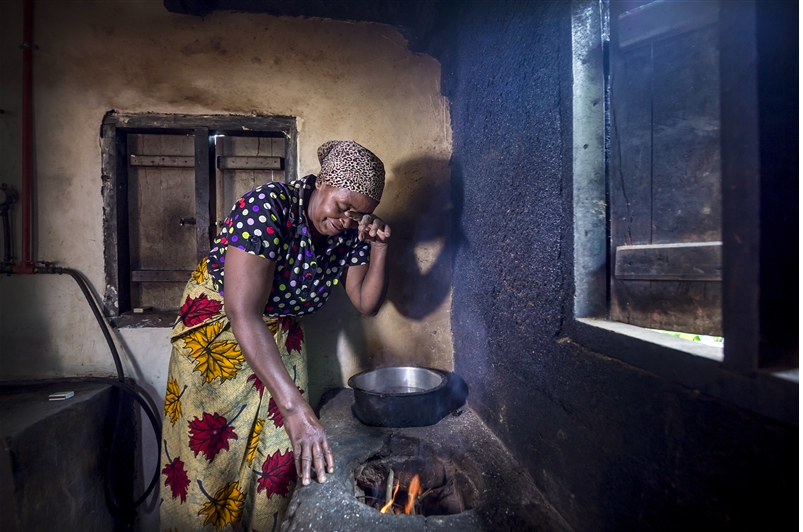
Uganda’s Air Pollution Crisis: The Impact of Unclean Energy on Women, Children, and the Elderly
Uganda faces a serious air pollution crisis rooted in its dependence on unclean energy sources like firewood and charcoal. This reliance impacts health and wellbeing, disproportionately affecting women, children, and the elderly — the most vulnerable segments of the population. The widespread use of traditional cooking fuels not only harms individual health but also places a strain on public health resources, perpetuating poverty cycles and limiting economic opportunities for families across the country.
With over 90% of Ugandans relying on firewood and charcoal for cooking, indoor air pollution from these fuels is a pervasive issue. For many families, particularly in rural areas, these unclean energy sources remain the only affordable and accessible options (WHO, 2022). While electricity and liquefied petroleum gas (LPG) are considered cleaner alternatives, they are often too costly and inaccessible for the average Ugandan household. Thus, families are compelled to use traditional biomass, resulting in widespread indoor air pollution that contains harmful pollutants like carbon monoxide, particulate matter (PM2.5), and volatile organic compounds (VOCs).
The effects of indoor air pollution are magnified by limited ventilation in homes, especially in urban slums and informal settlements. Studies show that air pollution levels inside homes using unclean energy are up to nine times higher than WHO-recommended safe limits for PM2.5 (WHO, 2022). As a result, people who spend the most time indoors are exposed to dangerously high pollution levels, causing a range of health issues that disproportionately affect women, children, and the elderly.
Women in Uganda are particularly vulnerable to indoor air pollution due to their role in cooking and household activities. Spending hours in poorly ventilated kitchens exposes them to harmful smoke and toxins daily, leading to an increased risk of chronic respiratory conditions like asthma, chronic obstructive pulmonary disease (COPD), and even lung cancer (World Bank, 2021). According to health reports, prolonged exposure to these pollutants weakens respiratory systems and increases the risk of cardiovascular diseases.
Women’s exposure to indoor air pollution also has economic and social consequences. The time they spend cooking with unclean fuels could be redirected to income-generating activities if they had access to clean energy. In addition, medical expenses related to pollution-induced illnesses further burden low-income households. Women who fall ill or need to care for family members affected by respiratory illnesses may also miss work, perpetuating cycles of poverty and dependence (UNDP, 2020).
Children are especially susceptible to the harmful effects of air pollution from unclean energy sources. Young lungs are still developing, making them more vulnerable to toxic particles released from burning wood and charcoal. Exposure to high levels of PM2.5 and other pollutants increases the risk of respiratory infections, such as pneumonia, which is a leading cause of child mortality in Uganda (UNICEF, 2021). Long-term exposure can also impair cognitive development, impacting children’s academic performance and future opportunities (WHO, 2019).
The risks extend beyond immediate health issues. Studies suggest that children who grow up in households that rely on unclean cooking methods are more likely to develop chronic respiratory problems and reduced lung function over time. With the high rate of air pollution-related illnesses, children also miss school frequently, which disrupts their education and limits their future potential. The negative impact of indoor air pollution on children’s health underscores the need for a transition to cleaner fuels to protect Uganda’s next generation (Global Alliance for Clean Cookstoves, 2020).
For the elderly, who often have pre-existing health conditions, the effects of air pollution from unclean energy are particularly severe. The immune system weakens with age, making older adults less capable of coping with toxins found in indoor air pollution. Conditions like COPD, asthma, and heart disease are exacerbated by exposure to PM2.5 and other pollutants, increasing the likelihood of hospitalizations and premature mortality (WHO, 2022).
Moreover, elderly individuals often live in the same households as their children and grandchildren, increasing their exposure to indoor air pollution. They may also spend more time indoors, especially those with mobility limitations, which further heightens their vulnerability. As a result, the elderly experience higher rates of respiratory distress and are more susceptible to pollution-related deaths, contributing to an increase in healthcare costs and a greater strain on family members who must care for them (Global Burden of Disease Study, 2021).
The Ugandan government has made efforts to promote cleaner energy sources, but these initiatives face challenges related to affordability, accessibility, and public awareness. Despite the availability of improved cookstoves and cleaner fuels, uptake remains low in rural areas due to costs and cultural preferences for traditional cooking methods. Some programs, led by non-governmental organizations, have introduced subsidized clean cookstoves, but limited funding has hindered widespread distribution (Ministry of Energy and Mineral Development, 2022).
Education and awareness campaigns highlighting the health risks of unclean energy are essential for behavioral change. Engaging community leaders and women’s groups can help disseminate information about the benefits of clean cooking, thereby encouraging adoption. Additionally, the government could partner with the private sector to provide subsidies and incentives that make clean cooking technologies more affordable for low-income households (UNEP, 2022).
International collaboration is also vital. Partnerships with organizations like the World Health Organization (WHO) and the United Nations Development Program (UNDP) could provide Uganda with technical support and resources to promote cleaner energy sources and build sustainable energy infrastructure.
Uganda’s dependence on unclean energy sources has created a hidden crisis, harming women, children, and the elderly in countless ways. The health impacts of air pollution are far-reaching, affecting not only individual wellbeing but also the country’s economy and public health system. Moving towards cleaner energy solutions is not only a public health necessity but also an investment in Uganda’s future. Through policies that promote clean energy access, community-based education, and international cooperation, Uganda can make significant strides in reducing air pollution and improving the lives of its most vulnerable populations.
By addressing air pollution and transitioning to cleaner energy, Uganda can build a healthier, more sustainable future for all its citizens. The time to act is now, before another generation is subjected to the hidden but deadly dangers of unclean energy.
